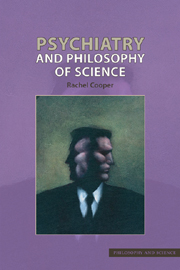Book contents
- Frontmatter
- Contents
- Acknowledgements
- 1 Introduction: psychiatry and philosophy of science
- 2 The nature of mental illness 1: is mental illness a myth?
- 3 The nature of mental illness 2: if mental disorders exist, what are they?
- 4 Explanations in psychiatry 1: natural-history based explanations
- 5 Explanations in psychiatry 2: individual case histories
- 6 Relations between theories 1: when paradigms meet
- 7 Relations between theories 2: reductionisms
- 8 Managing values and interests 1: psychiatry as a value-laden science
- 9 Managing values and interests 2: big business and judging treatments
- 10 Conclusion
- Notes
- Further reading
- Bibliography
- Index
5 - Explanations in psychiatry 2: individual case histories
- Frontmatter
- Contents
- Acknowledgements
- 1 Introduction: psychiatry and philosophy of science
- 2 The nature of mental illness 1: is mental illness a myth?
- 3 The nature of mental illness 2: if mental disorders exist, what are they?
- 4 Explanations in psychiatry 1: natural-history based explanations
- 5 Explanations in psychiatry 2: individual case histories
- 6 Relations between theories 1: when paradigms meet
- 7 Relations between theories 2: reductionisms
- 8 Managing values and interests 1: psychiatry as a value-laden science
- 9 Managing values and interests 2: big business and judging treatments
- 10 Conclusion
- Notes
- Further reading
- Bibliography
- Index
Summary
In this chapter we turn to a different and contrasting form of explanation that is also frequently found in psychiatry. We shall consider explanations provided by case histories that seek to make sense of a person's behaviour in terms of his or her psychological states. I want to explore how such case histories provide explanations, the circumstances under which they can fail and the extent to which the use of case histories in psychiatry suggests that psychiatry is like other sciences. To these ends, I shall explore how recent simulation accounts of folk-psychological understanding can help us understand how such case histories work.
The simulation account of folk-psychological understanding
Often we can predict the future behaviour of systems either by using theory or by using a simulation. To take a frequently used example, suppose we are building a bridge and want to know whether our design will withstand the winds in a particular valley. We might work this out in either of two ways: we might use a theory, and using the laws of physics do various calculations to see if the bridge is strong enough; or we might use a simulation, and predict the behaviour of the bridge by making a scale model and placing it in a wind tunnel. When we use a simulation to predict, we use a system that is analogous to the target system and reason that the two can be expected to behave similarly.
- Type
- Chapter
- Information
- Psychiatry and Philosophy of Science , pp. 67 - 82Publisher: Acumen PublishingPrint publication year: 2007



